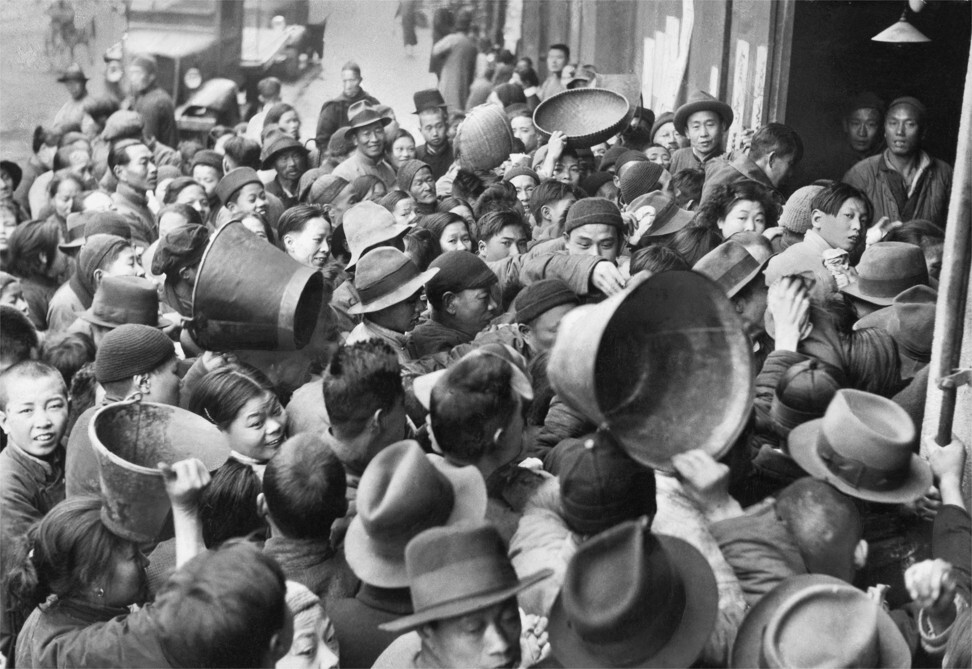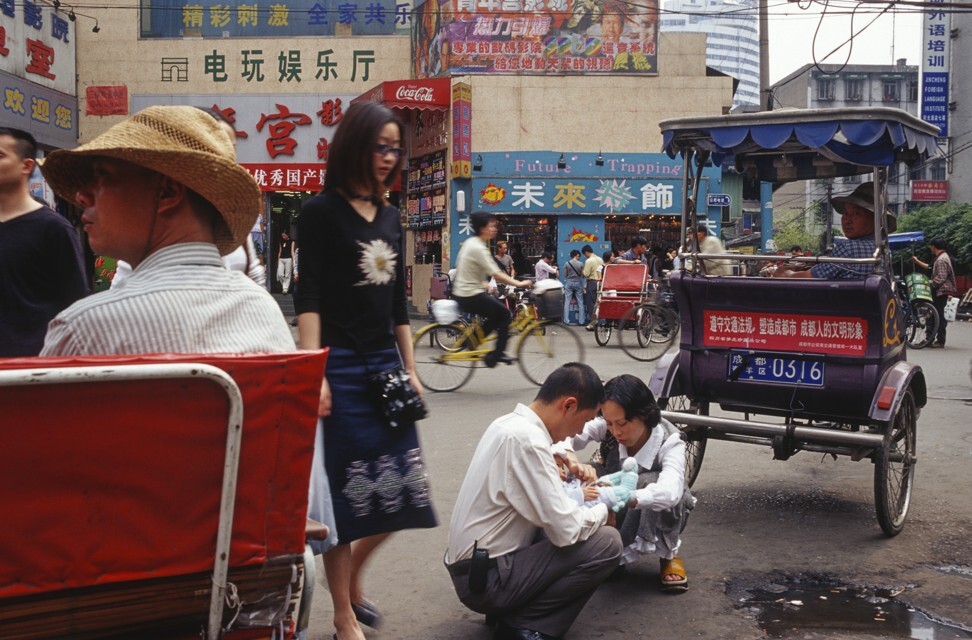Source: SCMP (7/18/20)
‘I’m a Chinese writer, I write about this place and I don’t wish to go elsewhere,’ says Murong Xuecun
The enfant terrible of Chinese literature talks about growing up in rural poverty, becoming a writer in the internet age, and why he thinks we’re living in dangerous, chaotic times
By Thomas Bird

Chinese writer Murong Xuecun. Photo: Handout
Frosty beginnings: In the late 1950s and early 60s a great famine swept across China and my paternal grandfather starved to death. Fearing hunger, my grandmother fled from Shandong province to northeast China with her three children in tow, including my mother. She would go on to meet my father in a small village in Jilin province. The village was situated in the foothills of the Changbai Mountains, a range that crosses Manchuria and North Korea. In winter, the place could freeze like ice cream.
I was born there at the tail end of the Cultural Revolution, in 1974, the middle child of three but I have few memories from those years. When I was two years old, my parents took us back to Shandong, where we lived in Xunzhai Village, a tiny little place situated about 30km from the port city of Qingdao.
My prevailing memory from this period is one of poverty. We only ate meat twice a year and all my clothes were patched and worn. When, in 1988, my father died, my mother took us back to Jilin. To this day, I never know whether to say that I’m a Shandonger or a Northeasterner.
Getting bookish: As a young rural kid I had to help with the farm work. Every year, once the wheat harvest was brought in, the villagers would invite a blind storyteller to tell us oral folk tales. He would regale us with the adventures of historical heroes, demons and ghosts. For us, this was like opening a door to the world beyond the limits of our own humdrum existence. He inspired me to become a reader.

Widespread famine swept through China from the late 1950s to the early 1960s. Photo: Getty images
I started with the comic-book versions of classics like Romance of the Three Kingdoms. By my early teens, I was reading full works of Chinese fiction even if I couldn’t understand all the words. There weren’t many books in the countryside at that time so I would read anything I could get hold of. Once I went to dinner at a relative’s house, where I found a newspaper. I remember sitting on the kang (Chinese bed-stove) and reading it from cover to cover.
Law stories: My mother had only three years of schooling, my father none at all. But my generation was different as we lived through more stable times. In Jilin, I took the gaokao exam and was admitted to the China University of Political Science and Law, in Beijing, in 1992, where I studied for four years. The campus was 30km from the city centre and we seldom went into “town”, as we called it.
To be honest, I had little interest in the legal profession and didn’t see myself becoming a lawyer or a judge but it was a good school so I just persevered until I graduated. Later, of course, I would use my knowledge of the legal profession acquired at this time – as well as some dirty stories I heard – when writing my fourth novel, Dancing Through Red Dust (2015), a thriller about a corrupt lawyer.
Labour market: After I graduated, in 1996, I went to work in a state-owned company in Chengdu, Sichuan province, where I was employed as both a legal adviser and as a salesperson. The salary was low, just 280 yuan a month, and it was a really unstimulating job. But I was reasonably happy, as any freshly graduated young person would be, and spent much of my time hanging out with friends and playing mahjong.
Chengdu is a leisurely city by Chinese standards and the food is out of this world. I put on weight there. After two years at the state-owned company, I couldn’t take the tedium any more so I left to work in the private sector. I found work in a skincare company, which transferred me to Shenzhen.
Internet sensation: At the turn of the millennium, the internet really began to affect our lives. It was about this time that a new generation of Chinese writers were serialising stories online. Before, fiction had been controlled by the state as all the novelists were members of the Chinese Writers Association, but now people could express themselves in all sorts of ways. I read a lot online and even had a go at posting some stories.

Chengdu, in China, in the 2000s. Photo: Getty images
It wasn’t until 2002, by which time I was living and working in Guangzhou, that I decided to write a full-length work of fiction. I had witnessed a lot as a white-collar worker. So I resolved to write Leave Me Alone: A Novel of Chengdu, based on an ex-colleague who had been arrested for misappropriating funds. At first, just a few people read it. Over the next fortnight, people began to comment and repost it. After a month, the novel had become an online phenomenon, discussed in forums nationwide.
Publishing houses started to contact me and seven months after I’d posted it online, the novel appeared in bookstores. Tens of thousands of legitimate copies were sold as well as many pirated versions. By 2004, it had become so popular that a high-ranking official held a meeting in Chengdu regarding how certain books could cast the city in a dark light. That’s a shame as I have always loved Chengdu, even though there are now streams of tall buildings and everyone talks about making money.
Found in translation: From 2003 to 2004, I again lived in Shenzhen, where I researched and wrote my second novel, Heaven to the Left, Shenzhen to the Right, a Gatsby-esque tale of a man who made his fortune only to lose himself in the southern boomtown. Then, in 2005, I received an email from a British person living in Hong Kong called Harvey Thomlinson. He told me he wanted to translate my first novel into English.
A few months later, a television film based on this novel was shot in Chengdu so we met up in the city to check out some locations that featured in the novel. We continued to communicate after the trip and rendezvoused in Shanghai and Sanya, on Hainan Island, where we went swimming together. I thought foreigners were good at swimming but I discovered in Sanya that I was better than Harvey. Since Harvey translated my first novel my work has been translated into 16 languages and published in nearly 20 countries.
Around the world: My writing has taken me to literary festivals and universities all over the world. In 2012, I attended the Hay Festival in Wales with Harvey, where I met a hero of mine, Salman Rushdie. I love Graham Greene’s novel Brighton Rock (1938) – he’s a big inspiration – so I went to Brighton to see if it smelled as sinister as I imagined and to find some of the restaurants, cafes and streets included in the book.
A few years later, Harvey and I held an “Orwell Day” in London. We visited the BBC to see where George Orwell worked, his “Room 101”. Then we went to Notting Hill to buy a first edition of Nineteen Eighty-Four, and to check out Orwell’s former residence. I love London. Berlin, Paris and New York, too. I think because I was born in a small village, I always yearn for big cities. Beijing is a special city, too. Beyond the political environment it is a rich and exciting place.
Speaking out: Countless disasters and suffering are related to corruption. A writer living in China is obliged to comment on and record this issue. But China has changed since I started writing. The early 2000s were a relatively liberal time, when a lot of freedoms were permitted. But censorship has been creeping back.
In 2011, I gave a speech at the Foreign correspondents Club in Hong Kong, titled “Words we can use, and those we cannot.” An article about it was published on The New York Times’ website. This earned me the opportunity to write for The New York Times from time to time, and, in 2013, I became a columnist for the newspaper. I spent a lot of time in Hong Kong during this period while writing those op-eds. I liked the sense of liberty as well as the delicious Cantonese cuisine, which I love almost as much as Sichuanese cooking.But living in Hong Kong is not easy as a native Mandarin speaker and I always felt like an outsider, so, in 2016, I went back to Beijing. That may sound strange but I have many like-minded friends in the capital, it is where most writers live. In addition, as dissidents, Beijing is safer, as the police in small cities can be really cruel.
2020 vision: This has been a critical year for China and the world. The Covid-19 outbreak has spread from Wuhan to every corner of the globe. I visited Wuhan in the aftermath but I am currently more worried about the United States than China. The terrible floods in the south of China have also been a huge disaster.
Meanwhile, due to new surveillance policies the situation for dissident voices like mine is getting worse and worse with every passing month. What I am most afraid of is that we will return to a situation akin to that of the Cultural Revolution. These are dangerous, chaotic times and friends have urged me to go overseas. But I’m a Chinese writer, I write about this place and I don’t wish to go elsewhere.
So, after a few years of absence from the literary scene, I’ve found an isolated spot to write a new book even though I am currently banned from publishing any new material. Although this book will probably be published in English first, I will continue to write, to comment on this age I live in and what I see around me. Many people think I’m a dark person but I’m quite cheerful really – a warm being and an optimist. I just say what needs saying.